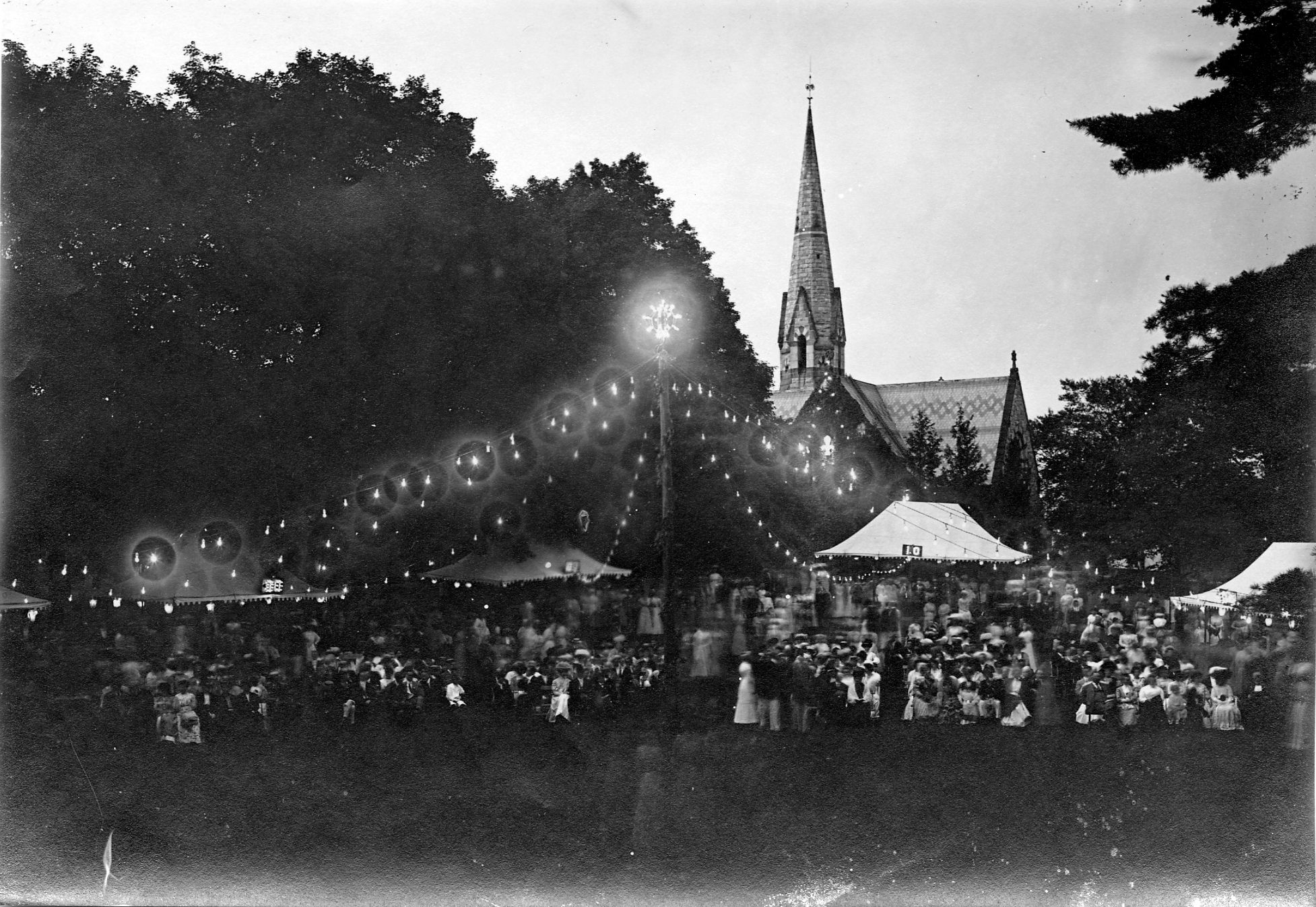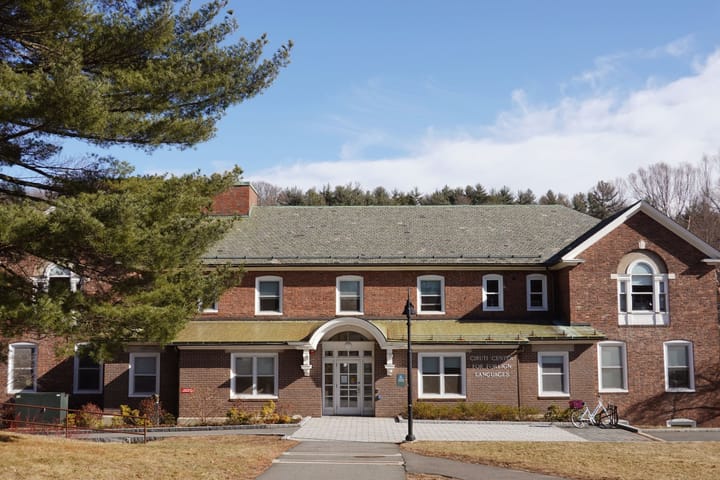A Better Amherst: A ‘New Curriculum’
Tessa Levenstein ’23 and Mason Quintero ’23 advocate for more service-oriented learning at the college, arguing for community to become a central tenet of an Amherst education.


This op-ed is the third part of a three-week series entitled “A Better Amherst.” In this series, we examine how Amherst could better connect its students to impactful work and, in doing so, be better for both its students and the world.
“Amherst College prepares students to use ideas to make a difference in the world.” - Amherst College Profile
As Amherst College entered its 119th year, then-president Stanley King told students something that sounds eerily familiar to our modern ears: in 1939, Amherst students were living through unprecedented times. World War II had just begun in Europe, and King declared, “What effect that war will have on America no man can tell. But that it will affect America profoundly we all know. It will affect this college. It will affect your lives and mine.”
In response to World War II, Amherst College changed. The Freshman Curriculum of 1942 read “in view of the national emergency, Amherst College is offering its students an accelerated program which, if they choose to follow it, will allow them to complete a normal college course in three years.” The college also developed programs, such as the Civilian Defense School, in order to equip its students for wartime. Amherst responded to the needs of the historical moment by creating what President King dubbed the “New Curriculum.”
During my first year at Amherst, the UN published its 2018 report on climate change which reported that we have only twelve years to limit “devastating” global warming (that’s eight years now — if you are counting). The 2022 report, released this Monday, warned that we are on track to reach 1.5 degrees of warming in the next two decades. As a result, the report said, humanity will increasingly struggle to grow food; fires and floods will create millions of refugees, and hundreds of millions, if not billions, of people will face chronic water scarcity.
We have other worries on top of climate change. Humanity also faces Covid-19, the global democratic crisis, and, in just the last week, the geopolitical emergency in Ukraine. Indeed, President King’s language is hauntingly similar to the email we received from President Martin this week: “The implications and repercussions of this invasion will ultimately affect us all.” We face crises of historical proportions. In 1939, Amherst College adapted its education to fit the realities of an unprecedented historical moment. In 2022, Amherst must do the same.
Amherst needs to create more opportunities for students to connect learning with action through “engaged scholarship.” Engaged scholarship is a category of courses and research which: (1) addresses a pressing issue of public concern, (2) builds knowledge toward solving that issue, and, (3) engages with the communities, or organizations involved with the issue.
Swarthmore College provides stellar examples of engaged scholarship. Students in statistics classes work with community organizations to help them answer data-based research questions. Black Studies and Environmental Studies students can intern with local community organizations in a course which “combines meaningful readings, regular reflection sessions, and in-depth conversations with [local] community leaders.” Students in economics classes design and implement behavioral economics experiments with real subjects in partnership with a research center in Nairobi, Kenya. These courses enable students to help solve world problems.
While Amherst offers community-based learning courses, these classes rarely allow for actual application. Even if these classes were equivalent in their impact, Swarthmore offers three times as many as Amherst (adjusted for size), making them far more available to students. Engaged scholarship is an important part of making a better Amherst, but we need more.
Many Amherst College students spent hundreds of hours volunteering in high school. But once we get to Amherst, our lives become overwhelmed by the classwork that we are taught to prioritize above all else, and we cease to be embedded in our local community. As a result, we stop volunteering. It is not just that Amherst doesn’t actively encourage volunteerism — it’s that Amherst’s demanding curriculum means students are actively discouraged from community service.
To address this problem, Amherst should expand what it counts as course credit to include certain internships and volunteering opportunities. Students at Colby, Hamilton, and Trinity, are able to get course credit for internships. We believe that education for education’s sake is an important part of creating change in the world, and is essential to leading rich and meaningful lives. However, if education is not paired with action, nothing can change, and the world needs our help now. It cannot wait for us to graduate.
Our education is supposed to empower us to create change in the world. But we’ve found that learning about all the ways in which the world is crumbling without having the time or support to actually contribute towards helping fix things, is, in fact, disempowering. Amherst students are experiencing a frightening mental health crisis. And since the causes of this crisis are complex, its solutions must be expansive and diverse. According to a study published in the Journal of Happiness, people who volunteer feel more satisfied with their lives and report better health. Not only that, but there’s a correlation between how often people volunteer and how satisfied they feel. If Amherst were to adopt this “New Curriculum,” therefore, one result would be a positive effect on mental health.
These changes and the ones proposed in our last article serve the same goal: making Amherst better for its students and better for the world. This testimonial demonstrates the connections between impactful courses and impactful careers. Raj Borsellino ’08 is a Senior Program Officer at Robin Hood, an organization which funds charities that effectively and sustainably raise people out of poverty in New York. Raj explained, “I discovered the Reading, Writing, Teaching course my sophomore year. The opportunity to work closely with students at Holyoke High School, many of whom were incredibly smart and motivated but faced a range of barriers to success, helped me find a purpose again. The experience inspired me to spend my first year out of college as a high school teacher, and put me on track towards a career in public service.”
Imagine if Amherst were to make all of the changes proposed in this op-ed series. Imagine an Amherst that is among the country’s most reliable producers of impactful changemakers at the community, national, and global level. Imagine an Amherst with a reputation for producing record numbers of prestigious fellowship winners; for the ubiquity of its alumni at the highest echelons of impact organizations. Imagine an Amherst whose prolific engaged scholarship makes it a hub of social impact, and where taking action on pressing issues is a part of every student’s academic experience. Imagine an Amherst known for being the place where students go to lead the most impactful and meaningful lives.
This Amherst would be a better Amherst. And we hope you see this op-ed series as an invitation to turn that aspiration into a reality — for students, faculty, and administrators alike. If you have additional ideas for how Amherst can be better for the world, we invite you to join the conversation: send us an email, and let’s begin the work to make this college a better one.



Comments ()